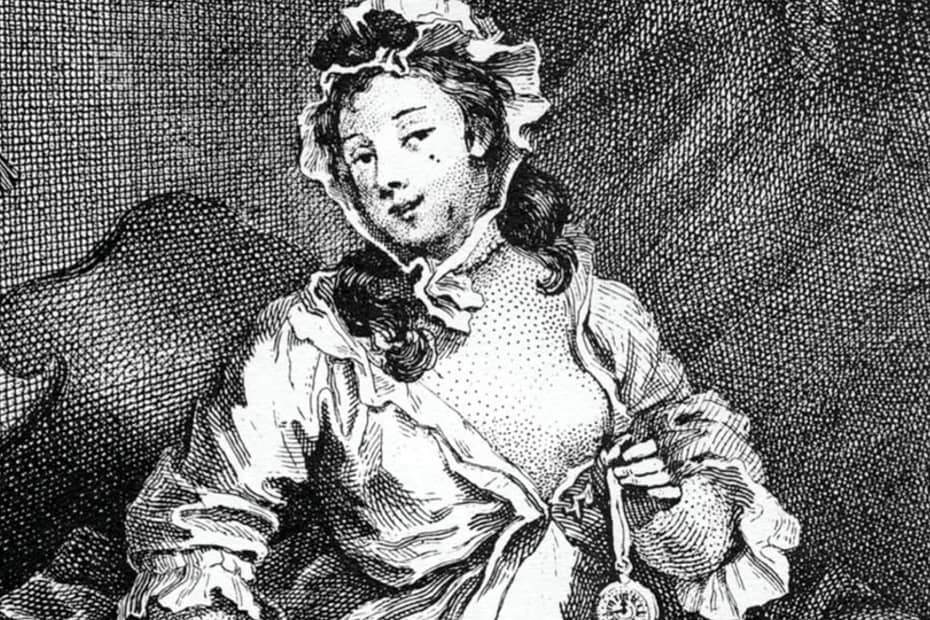Daniel Defoe’s Moll Flanders was published in 1722 and had a significant social impact due to its astonishing storyline and innovative style. Moll Flanders narrates the story of a woman from the lower classes who struggles to survive on her own. Born and abandoned in Newgate Prison, Moll is forced to make her own way in life. She embarks on multiple careers, from a wife to a pickpocket, until her failures eventually catch up with her. Moll recounts her adventures with irresistible wit and candor, leaving the reader uncertain whether she is a real-life redeemed sinner or just a successful opportunist. This essay intends to discuss didactic eighteenth-century novels and how Moll Flanders both adheres to and subverts that formula.
In eighteenth-century England, women were widely excluded from advanced schooling. Middle- and upper-class women were to be instructed on how to be perfect companions for their husbands-to-be. The accomplishments such ladies were expected to learn included singing, foreign languages, dancing, needlework and playing a variety of musical instruments. Modesty, grace, bashfulness and delicacy were a must. Strict constructs of femininity and domesticity were upheld and defended in publications such as pamphlets, conduct books, periodicals and magazines. According to Vasconcelos (1995):
A new rising society demanded new habits and the reformation of institutions, like marriage, and gave women a new role within it. Much of what society expected of her, her subordinate condition and limited horizons are expressed in Steele’s dictum: ‘All she has to do in this world, is contained within the duties of a daughter, a sister, a wife, and a mother’ These notions were instantly hammered in articles, essays, reviews which helped shape a new ideal of gentility and womanhood.
One must highlight that the novel also played an important role in this cultural movement as it worked as a means of reinforcing the gender constructs. Eighteenth-century novels were often written with an underlying didactic purpose, aiming to instruct readers through example by promoting virtue and punishing vice. The protagonists of those novels were handsome, modest, humble and delicate as they worked through the troubles that came their way as models of femininity. The sentimental novel portrays women as innocent beings who were trying to fend for themselves in a world infested with male predators. In Moll Flanders, the novel’s self-proclaimed didactic purpose can be read as ambiguous. Defoe presents the novel as an autobiography, emphasizing that there is a lesson to be learned through this old woman’s sinfulness and repentance. He states that the novel is intended to be a deterrent to crime and an example of the rewards of repentance. Nevertheless, the novel encompasses more than it purports to convey. Defoe often highlights that lower-class and middle- and upper-class women have completely different lives. While the former count on the protection family and wealth, the latter often lived under precarious arrangements. Poor women often needed to work to sustain themselves and when most professions were closed to them, “honest” employment could not always be procured. Under the guise of a penitent old lady, Moll still describes the unconventional ways she managed to socially ascend. The novel is thus not just about repentance; rather, it suggests that in a society where the scales are so clearly tipped against women, it is only fair that they produce their own opportunities. According to Swaminathan (2003):
In contrast to the ideal of the conduct manual, Moll’s narrative portrays neither a stable family life nor secure economic conditions, and she regularly deals with the underworld that shadowed polite society. Defoe is able to portray the darker elements of society in which basic needs such as food and shelter overshadow (at least initially) religious and moral instruction. […] Admiration for Moll’s resourceful survival techniques is not intended to overshadow the rewards that came from true repentance at the end of the novel. […] Defoe extends the moral and religious instruction of the conduct manual to include non-ideal circumstances, but the imaginations of his readers are really excited by the collective ingenuity displayed by the characters in negotiating those circumstances. Thus, Defoe’s alternative conduct manual both fulfills and exceeds his desire to complicate the ideal and offer religious instruction. Conduct in underclass circumstances, such as economic and marital instability, becomes a conduct for survival, and Moll Flanders Suggests that the most successful practitioners of this conduct for survival are women.
While Swaminathan makes an excellent point, I would disagree with the conclusion that “admiration for Moll’s resourceful survival techniques is not intended to overshadow the rewards that came from true repentance at the end of the novel.” I believe Defoe departs from Moll’s declaration of repentance merely because doing so would make the novel more palatable for its time. Moll Flanders is undoubtedly one of the most notable eighteenth-century novels for its witty portrayal of an unconventional “gentlewoman”.
References:
RICHARDSON, Samuel. Pamela or, Virtue Rewarded. Oxford: Oxford University Press, 2001. [1740].
SWAMINATHAN, Srividhya Defoe’s Alternative Conduct Manual: Survival Strategies and Female Networks in Moll Flanders. Disponível em: <https://ecf.humanities.mcmaster.ca/15_2swaminathan/>. Acesso em: 3 dez. 2023.
VASCONCELOS, Samuel. The Rise of the Novel and Constructions of Femininity. In: Crop (FFLCH/USP), São Paulo, n.2, p.32-35, 1995.
Publicado por
Rafaela Culuchi Benfica
Rafaela Culuchi Benfica, aluna do curso de Letras Inglês/Literaturas da Uerj. É professora de inglês, além de ser bolsista no Projeto Clube de Leitura de Literatura Norte-Americana (UERJ). É apaixonada por ensino de literatura, escreve como hobby e seu gênero literário preferido é romance.
